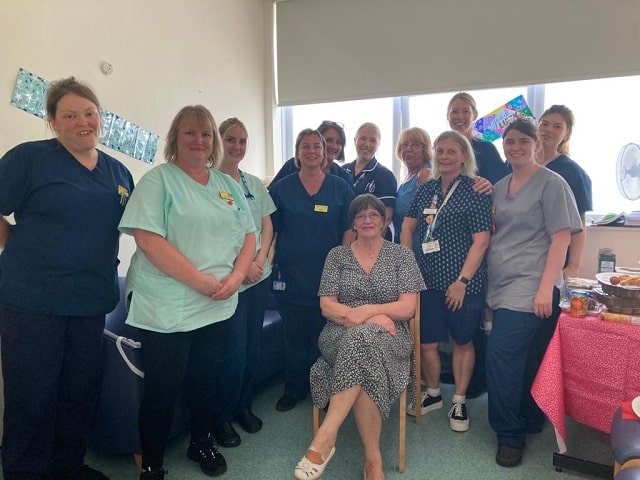
By Liz Crudgington
Julie Miller decided she wanted to be a nurse at the age of just three.
Now 67, she has officially retired from her role as deputy ward manager of Birchington ward at the Queen Elizabeth The Queen Mother Hospital in Margate – but returned as pre-assessment sister for two days a week.
Julie has been part of the gynaecological and gynaeoncology ward team since it opened more than 20 years ago, and has worked at the QEQM since 1978 when she began her training as a midwife, after qualifying as a nurse in Wolverhampton.
After almost 50 years dedicated to caring for others, Julie is in no immediate rush to hang up her uniform, although she is looking forward to having more time to spend with her children and grandchildren.

She said: “After working for 48 years as a nurse, I think just stopping would not be good for me, and I would definitely miss the team and the patients.
“Gynae patients are very special, with very special needs, and they need nurses who understand that.
“A lot of them are having a hysterectomy and are frightened; they have a real emotional attachment to their uterus, and it has an impact on their sexuality, their wellbeing and their mental health when they face losing it, especially younger women.
“You need to be comfortable discussing it with them, and giving them permission to talk about how they feel and to ask questions about their sex life and anything else.
“There are some people who stay with you, and several who have made a great impact on me. Having known them and nursed them has made me a better person because of what they have been through and the way they have faced their challenges.”
Changes through the years
Julie has seen many changes throughout her career, from the introduction of computers to replace hand-written notes, to the reconfiguration of wards from one long room to separate bays.
Training has also changed, with student nurses in the 1970s needing to be single and ‘of good moral character’.
Julie said: “I started my training in 1974 and as part of our induction we were told the best form of contraception was to say no.
“If you did get pregnant, you were off the course – there was no option to defer and return.
“We had to live in for the first 18 months, ideally for all three years, and there was a strict hierarchy on the wards, even among the students, with the senior students teaching the level below them and so on.”
After qualifying, Julie worked on an orthopaedic ward and wanted to do further training in that area but the course was full, so she chose midwifery and moved to Kent, where she has stayed ever since.
As a midwife, she covered community, the wards, and the antenatal clinic, caring for hundreds of families over the years.
She said: “We had a wonderful antenatal clinic sister who was really forward-thinking, and the clinic was amazing. We were one of the first units in the UK to offer exercise to music and dance classes for pregnant women.
“First-time mums stayed in hospital for seven days, and we visited new parents at home every day for 10 days, which is very different to now.
“Back then, I don’t think anyone could have foreseen the technological advances that were coming – it has completely transformed the NHS.”
Julie made the switch to Birchington ward when it opened in 2001, and has never looked back.
She said: “It has always been a really lovely team here, right from when we opened the ward. Everyone is very supportive of each other, and prepared to help out, and everyone, no matter what their role or grade, is invited on nights out and to barbecues and other social events.
“We always include the housekeepers and domestic staff as they are part of the team. None of us can do our job without everyone else.
“I wanted to stay on to continue supporting the team – but I definitely won’t be here when I’m 70!”

